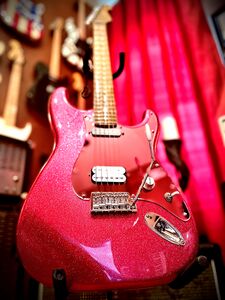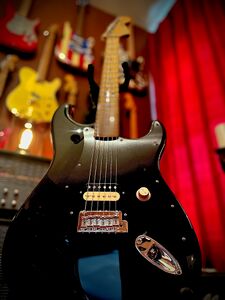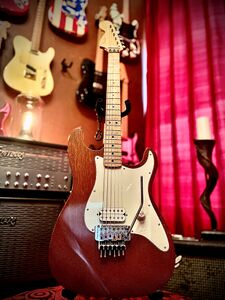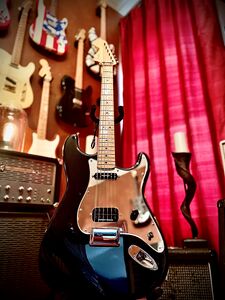Zim Zum
| Zim Zum | |
|---|---|
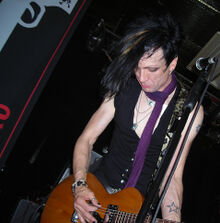 Zim Zum at a Pop Culture Suicides performance in 2009.
| |
| Background information | |
| Birth name | Timothy Michael Linton |
| Also known as | Zim Zum |
| Born | June 25, 1969 (age 54) |
| Origin | Chicago, Illinois |
| Genre(s) | Post punk, new wave, folk rock, progressive, electronica, experimental, industrial rock |
| Occupation(s) | Musician, guitarist, singer-songwriter |
| Instrument(s) | Guitar, vocals |
| Years active | 1989–present |
| Label(s) | Artfist, Interscope, Nothing |
| Associated acts | The Pop Culture Suicides, Pleistocene, Life Sex & Death, Marilyn Manson |
| Website | http://www.zimzum.com/ |
Timothy Michael Linton (born June 25, 1969), better known by his stage name Zim Zum, is a professional, multi-platinum musician and songwriter. He was the guitarist of Marilyn Manson during the Antichrist Superstar era and the recording sessions of Mechanical Animals before moving on to Pleistoscene in 2002, and The Pop Culture Suicides in 2005.
Zim Zum was the first member of Marilyn Manson whose stage name was not derived from the female celebrity/serial killer format. It came from the Lurianic Kabbalah, the Jewish mystical text. The word "Tzim-Tzum" is a Hebrew term meaning "contraction" or "constriction". It is the space where God contracted Himself to make way for creation.
Contents
Career[edit]
Marilyn Manson[edit]
After responding to an ad in "The Chicago Reader" and being 1 out of 15 from 1,000's of submissions to audition in Trent Reznor's New Orleans Studio. Zim Zum, a Chicago native landed the highly sought after guitar position in Marilyn Manson (replacing the original guitarist/founder, Daisy Berkowitz) and performed live with the band on their Dead to the World in support of their album, Antichrist Superstar.
While Zim was the official guitarist for that era, his credit on Antichrist Superstar is for the live guitar on the song, "Irresponsible Hate Anthem", as the album had been finished (written and recorded) by the time Zim Zum joined the band. He wouldn't receive his next writing credit until the following year when he composed "The Suck for Your Solution" on the soundtrack to the movie "Howard Stern's Private Parts", which achieved platinum record status.
The first live show with Marilyn Manson was at Nothing Records' "A Night of Nothing" showcase, opening for Nine Inch Nails and was only the 2nd time he ever played live. The show abruptly ended with the stage being destroyed and the paramedics removing a bloodied and unconscious Ginger Fish from the stage. Zim remained with the band throughout the Dead to the World tour and contributed to the EP Remix & Repent. His final live public appearance with the band was in Mexico City, 1997.
Mechanical Animals; Zim's second major label writing and recording, charted at number 1 on Billboards Top 200 in its first week of sales, which makes it the first Manson album to do so. It has since gone on to earn the multi-platinum status. He wrote and recorded on 10 of the 14 tracks on the album, which was released on September 15th, 1998. Zim Zum brought a glam-tinged style to the album that has not resurfaced on subsequent albums after his departure.
- Guitars Zim Zum played on recording the album
In the summer of 1998 Zim Zum left Marilyn Manson. The exact circumstances of his departure are not entirely clear as Zim Zum stated he resigned over creative differences, while Manson has claimed to have fired Zim for not attending band practice. After this he went on to pursue solo interests, including collaborations with with Cher and her son, Elijah Blue Allman ("Crimson and Clover" for the A Walk on the Moon Soundtrack), Korn (a remix of "Got the Life" with producer Josh Abraham), an appearance in Jane's Addictions "Three Days" concert film and a now notorious VH1's Behind the Music. He was also interviewed by Metal Edge, Alternative Press magazine, Kerrang! magazine and Bizarre Magazine and was named as one of the most influential guitar players of the last 4 decades by Guitar One magazine.
Zim left Hollywood behind and returned home, compelled to explore his musical vision in an art and music district in Chicago. Treading upon uncharted mental ground, he completely isolated himself in his Chicago studio (25/8) for more than a year, cutting off all ties to the outside world (no TV, radio or friends, barely talking to anyone) in an effort to guarantee the creation and production of his music completely unique in perspective and true to his own definitive musical statement. During that “self-imposed exile” he spent 14 hours a day writing and recording over 100 songs. This isolation experiment resulted in songs eerily echoing their creator's most intimate thoughts, moods, and personal struggles.
Pleistoscene[edit]
His unique Pleistoscene studio/internet project could be considered ahead of it's time for releasing 2 songs as free digital downloads before this was common practice. These downloads attracted over 500,000 hits in the first month it debuted.
Today, Zim talks about Pleistoscene as his “own orchestra” and states that it's still fully functional.
The Pop Culture Suicides[edit]
In 2005 Zim brought his main musical project, "The Pop Culture Suicides" to life. The band started releasing 4 songs ("To Have Lived and Died in the 21st Century", "The Art of The Bruise", "The Disillusioned Revolution" and "Whatever the Future Holds" through their official MySpace profile and have since released many more.
In 2009 Zim Zum finished recording The Pop Culture Suicides' conceptual double album that will be broken into and released as 4 EP's. The first two will be titled "Anti Social Pep Rally" and "Crash Cart Revival". All four will be released digitally, followed by the physically limited editions with all the extras. Zim has already released The Pop Culture Suicides' cover of the Buffalo Springfield song, "For What it's Worth", as a free high-quality mp3 download.
Gear[edit]
- Signature Fernandes APG/Dragonfly (red, black), standard tuning (EADGBE)
- Signature Fernandes Native (black), standard tuning (EADGBE)
- Signature Fernandes Monterey (natural finish) Eb tuning
- Fernandes Monterey (Clear lucite)
- Epiphone Les Paul Silver Sparkle, Drop D (DADGBE)
- Gibson SG (black), Drop D (DADGBE)
- Superstrat (Natural finish) standard tuning (EADGBE)
- Superstrat (Gloss black) Eb tuning
- '74 Les Paul Custom (Maple Neck)
- '76 Fender Stratocaster
- '76 Tele-Deluxe
- Roland 707 synth guitar
- Marshall 1960B 4x12 Guitar cabinet
Discography[edit]
- Antichrist Superstar (Marilyn Manson, 1996)
- Private Parts: The Album (soundtrack w/Marilyn Manson, 1997)
- Remix & Repent (Marilyn Manson, 1997)
- Mechanical Animals (Marilyn Manson, 1998)
- The Last Tour on Earth (Marilyn Manson, 1999) Appears on Limited Edition Bonus Disk only
- A Walk on the Moon (soundtrack w/Cher, 1999)
- All Mixed Up' (Korn, 1999)
- The Nobodies: 2005 Against All Gods Mix (Marilyn Manson, 2005)
Filmography[edit]
- Dead to the World (Marilyn Manson, 1998)
- Demystifying the Devil (Marilyn Manson, 2000)
- Three Days (Jane's Addiction, 2003)
Trivia[edit]
- At one point Zim Zum and Madonna Wayne Gacy shared an apartment.
External links[edit]
- Official website
- Official MySpace profile
- Official MySpace Music profile
- Official Twitter feed
- Official YouTube channel
- Trouble in the Manson Family
| Members of Marilyn Manson | |
|---|---|
| Current | Marilyn Manson |
| Former | Olivia Newton Bundy • Zsa Zsa Speck • Gidget Gein • Sara Lee Lucas • Daisy Berkowitz • Zim Zum • John 5 • Mark Chaussee • Tim Skold • Madonna Wayne Gacy • Rob Holliday • Wes Borland • Andy Gerold • Ginger Fish • Chris Vrenna • Fred Sablan • Twiggy |
| Associated performers | |
| Current | Paul Wiley • Juan Alderete |
| Former | Jason Sutter • Spencer Rollins • Daniel Fox • Tyler Bates • Gil Sharone • Brandon Pertzborn |
